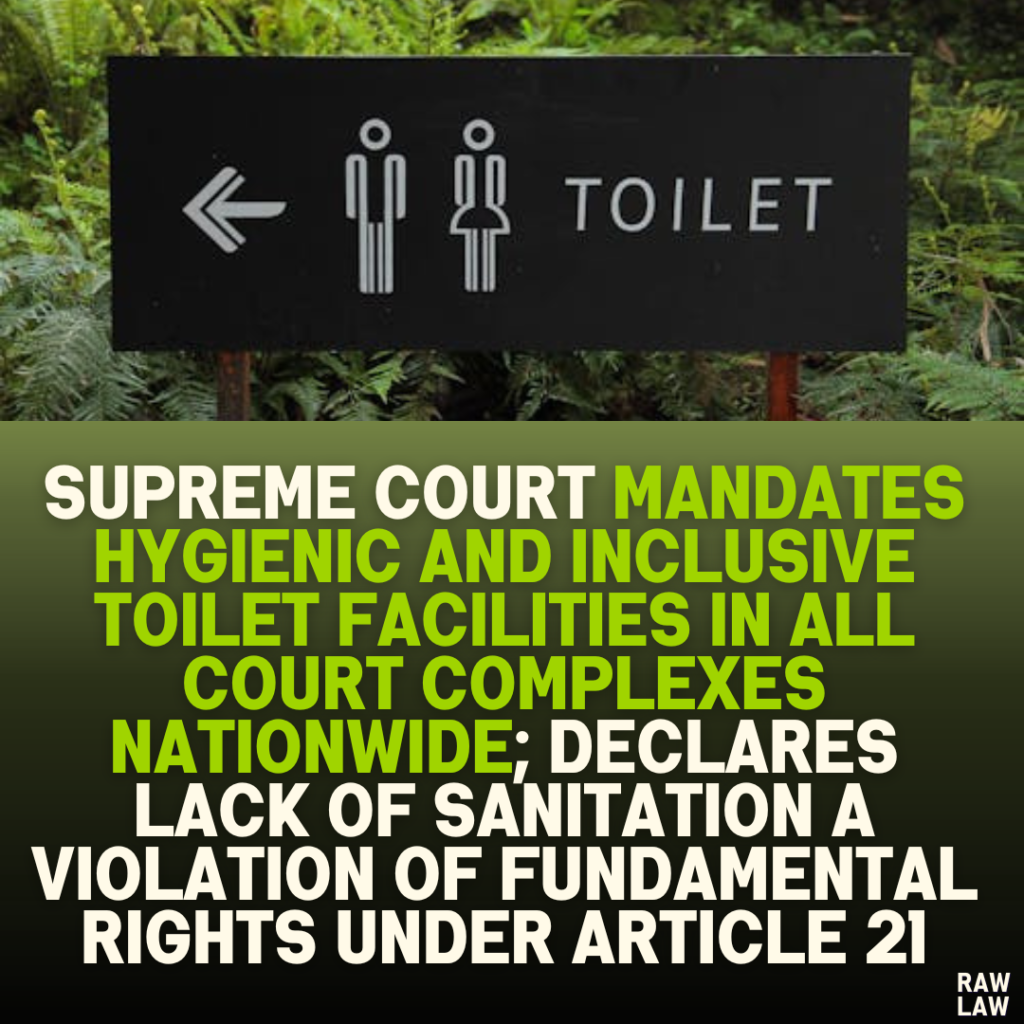Court’s Decision
The Supreme Court of India recognized sanitation as an essential aspect of the right to life under Article 21 of the Constitution. It issued comprehensive directions to ensure that all court complexes across the country, including High Courts, district courts, and tribunals, provide adequate toilet facilities for men, women, persons with disabilities (PwD), and transgender individuals. The Court held that the absence of such facilities violates fundamental rights and mandated swift action to remedy the situation.
Facts
A Public Interest Litigation (PIL) was filed by a practicing advocate under Article 32 of the Constitution. The petitioner sought a directive to ensure the availability and maintenance of basic toilet facilities in court complexes nationwide. The petition highlighted:
- Fundamental Right to Dignity: The lack of hygienic toilets infringes on the right to live with dignity under Article 21.
- Directive Principles: Articles 47 and 48A of the Constitution obligate the State to improve public health and sanitation.
- Swachh Bharat Mission: Existing government initiatives have established guidelines for constructing public toilets.
- International Standards: Global policies emphasize sanitation as a human right and a critical aspect of health and dignity.
The petition pointed out the dismal condition of toilet facilities in courts, particularly in district courts, where many were either non-functional or inaccessible to women, transgender persons, and persons with disabilities.
Issues
- Does the lack of hygienic and accessible toilet facilities in court complexes violate fundamental rights under Article 21?
- Are State Governments and High Courts obligated to provide and maintain such facilities under constitutional principles?
Petitioner’s Arguments
- Violation of Fundamental Rights: The petitioner argued that the absence of proper sanitation facilities infringes on the right to life and dignity guaranteed under Article 21.
- State Obligations: The petitioner emphasized the State’s constitutional duty under Articles 47 and 48A to improve public health and sanitation.
- Judicial Precedents: Reliance was placed on previous Supreme Court and High Court decisions affirming sanitation as a basic human right.
- Practical Realities: Many court premises, especially in rural and district areas, lacked functional toilet facilities, causing significant inconvenience to litigants, lawyers, and court staff.
Respondent’s Arguments
- Support for Sanitation Improvements: The respondents acknowledged the need for better toilet facilities and proposed measures, including:
- Regular audits to assess the condition of toilets.
- Separate toilets for various user groups, including PwD and transgender persons.
- Grievance redressal mechanisms to address maintenance issues promptly.
- Professional Maintenance: They suggested outsourcing maintenance to professional agencies, as successfully practiced in other public spaces like airports.
- Architectural Constraints: For heritage court buildings, respondents proposed modular solutions that preserve architectural integrity.
Analysis of the Law
The Court examined the legal and constitutional framework:
- Article 21 of the Constitution: The right to life includes the right to live with dignity, which encompasses access to basic sanitation.
- Directive Principles of State Policy: Articles 47 and 48A mandate the State to improve public health and sanitation.
- Transgender Persons (Protection of Rights) Act, 2019: Section 3 prohibits discrimination against transgender individuals in accessing public facilities, including toilets.
- International Obligations: The Court referred to international covenants and resolutions, such as the Universal Declaration of Human Rights and the International Covenant on Economic, Social, and Cultural Rights, which recognize sanitation as a fundamental aspect of human dignity.
Precedent Analysis
The Court relied on several key judgments:
- Vincent Panikurlangara v. Union of India: Affirmed the State’s duty to create conditions conducive to public health.
- National Legal Services Authority v. Union of India: Highlighted the need for separate toilet facilities for transgender persons.
- Common Cause v. Union of India: Recognized that the right to life includes access to basic necessities, including sanitation.
- High Court Cases: Various High Court judgments underscored the importance of providing hygienic toilet facilities in public spaces and judicial premises.
Court’s Reasoning
The Court observed that:
- Lack of Sanitation Violates Rights: Inadequate sanitation facilities undermine the right to life and dignity guaranteed under Article 21.
- Judiciary as a Role Model: The judiciary must lead by example in providing dignified and inclusive spaces.
- Poor Infrastructure: The Court criticized the deplorable state of toilet facilities in district courts and highlighted the need for immediate corrective measures.
Conclusion
The Court issued a detailed set of directions to address the issue:
- Construction and Maintenance: High Courts and State Governments must ensure the availability of separate toilets for men, women, PwD, and transgender persons in all court complexes.
- Committees for Oversight: Each High Court must constitute a committee to oversee the construction, maintenance, and functionality of toilet facilities.
- Grievance Redressal Mechanisms: Systems must be established for reporting maintenance issues and ensuring prompt resolution.
- Periodic Audits: Regular inspections must be conducted to assess the condition of toilets and ensure compliance with standards.
- Funding and Transparency: Sufficient funds must be allocated for construction and maintenance, with annual audits for accountability.
Implications
- Enhanced Dignity: The judgment reinforces the right to live with dignity and the judiciary’s responsibility to uphold fundamental rights.
- Inclusive Infrastructure: By mandating facilities for transgender persons and PwD, the Court promotes inclusivity.
- Improved Judicial Access: Better facilities will create a more welcoming environment for litigants and lawyers, ensuring equal access to justice.
The judgment is a significant step toward ensuring that court complexes across India reflect the principles of dignity, equality, and human rights.




Pingback: Delhi High Court Enhances Compensation to ₹13.17 Lakh for Fatal Road Accident Victim’s Family, Recognizing Prolonged Suffering and Ensuring Fair Wage Assessment - Raw Law